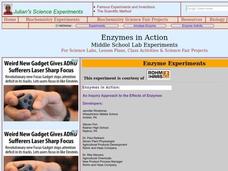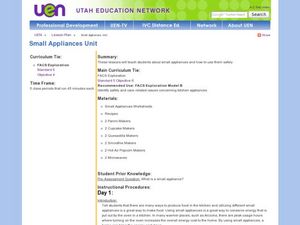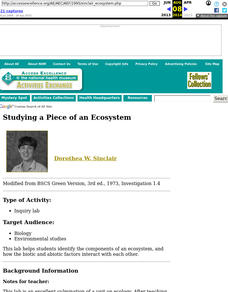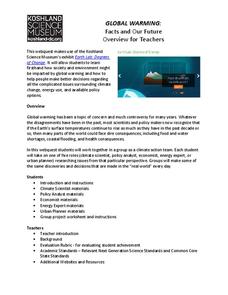Curated OER
Enzymes in Action
Students explore how enzymes are important in the chemical reactions of all living things. In this enzymes and catalysts lesson students complete an activity to see how enzymes change living things.
Curated OER
Ecology of the Savanna-Forest Boundaries in Central Brazil
Learners explore photosynthesis. In this photosynthesis lesson, students label parts of photosynthesis and take notes. Learners conduct experiments on leaves, make observations and record their findings.
Curated OER
Energy Forms
Students explore energy by participating in a science lab in class. In this energy form activity, students define the different types of energy such as light, mechanical and sound while examining energy measuring tools in class. Students...
Curated OER
Webbing the Food Chain
Students compose a visual representation of the food chain cycle using Inspiration educational software.
Curated OER
Life In Extreme Environments
Students work together to design and participate in experiments to determine the rate rotifers eat. After completing their experiments, they record and analyze their data and identify any challenges faced during the procedure. They...
Curated OER
Small Appliances Unit
An informative, but not particularly academic, unit about how to use a variety of kitchen appliances. Information about each appliance is given in a handout, as well as instructions for use and a few comprehension questions. This set of...
Curated OER
Moldy Jell-O
Mini mycologists plan an experiment to determine what affects the growth of mold on gelatin. A list of available materials is provided, but the procedure needs to be designed by the lab group. A data table is also provided in which to...
Curated OER
What Parts of a Plant Do We Eat?
Did you know that tomtoes and cucumbers are actually fruits? Biology or botany beginners read about the function of flowers and fruit and find that some food items commonly called vegetables are, by definition, also fruits! Give learners...
Curated OER
Walk a Mile for a Burger?
Students are introduced to the pedometer, and use this tool to associate physical activity (physical energy) with calories burned (chemical energy). They comprehend the making and burning of energy.
Micron Technology Foundation
Electricity
Conduct four electrifying electricity experiments that challenge young scientists to explore positive and negative charges and magnetic fields without the shock.
Curated OER
Pendulum Power
Eighth graders study the Law of Conservation of Energy and the Second Law of Thermodynamics. they create a pendulum out of either a rope with a bowling ball or barbell tied to one end.
Curated OER
Studying a Piece of an Ecosystem
Students carry out an outdoor land study in which they identify organisms living in the soil, and any other animals living within the site. Groups also examine abiotic factors. They respond to a series of questions concerning their data...
Curated OER
The Exceptional Nature of Cellulose
Students observe the affects of a substance's composition and structure have on its solubility. In this cellulose lesson students compare the amount of energy required to dissolve mono-saccharides with that required to dissolve...
Curated OER
Ecological Pyramids
Students apply the ecological pyramids of numbers and biomass with an activity using topographic maps. In this trophic level lesson, students work in groups using a topographic map to determine the number of organisms that can live in an...
Curated OER
Where do Plants Get their Food?
In this where do plants get their food worksheet, students design an experiment that will disprove the idea that plants obtain their food from soil. Students will set up their experiment and design a data table that will record data over...
Curated OER
Food or Fuel?
Students describe the process of transesterification utilizing chemical formulas. They construct and compare models of chemical structure of the substances involved in biodiesel production such as: alcohols, alkenes, alkanes, alkyls,...
Curated OER
Respiration
This series opens with diagrams of experimental setups. A data table is displayed and questions are asked, indicating that the intent is for lab groups to perform the depicted experiments. At slide twelve, a coherent lesson about the...
Curated OER
Evidence of Photosynthesis
Hands on science is the way to go! Learners conduct a lab experiment to help them explain how plants make food through photosynthesis. They test for the presence of starch in leaves using iodine solution and identify the basic things...
Curated OER
Venus Flytrap
Students study the Venus Flytrap including its habitat and how it eats. In this ecology lesson students complete several experiments using a Venus Flytrap to see how it reacts to various conditions.
National Academy of Sciences
Global Warming: Facts and Our Future
According to the United Nations, climate change affects every country on the planet. This research project encourages scholars to explore the factors that affect climate change from different perspectives: climate scientist, policy...
Cornell University
Glued into Science—Classifying Polymers
Explore the unique characteristics of polymers. A complete lesson begins with a presentation introducing polymers. Following the presentation, young scientists develop a laboratory plan for creating substances using polymers. They test...
Virginia Polytechnic Institute and State University
Lesson Plan: Successful Microwave Cooking
No need to be involved in a home economics or cooking courses to take advantage of this resource. Not only is there an explanation for how microwaves work but there are also tips for how to use the microwave, and cautions for what not to...
Curated OER
Digestion & Nutrition: a Case Study
Students explore digestion/nutrition and utilize scientific investigation skills. They complete meal logs for several days and graph their results. After analyzing their data, they write formal lab reports.
University of Connecticut
Building Your Own Biosphere
On September 26, 1991, four women and four men entered the scientific experiment, Biosphere 2; the doors were sealed for two years in order to study the interactions of a biosphere. In the activity, scholars explore biospheres by...

























